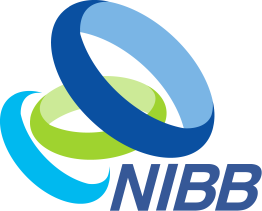
National Institute for Basic Biology

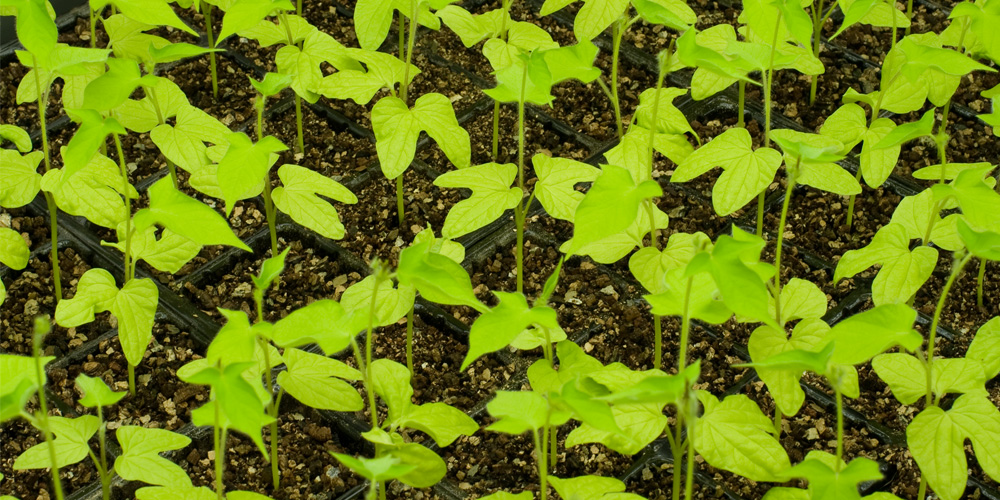
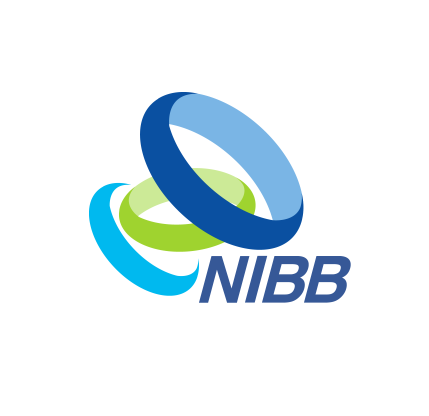

| Venue | EMBL Heidelberg, German |
|---|---|
| Date | Oct. 19-21, 2017 |
It was so lucky for me to have a chance to visit EMBL. The trip was wonderful and fruitful. I got some nice advice from my host lab and had an impressive experience in the following symposium.
My host PI, Dr. Rainer Pepperkok and his team members introduced their research to me, and discussed my current studies as well, during the one-day-stay in their lab. I got some useful advice from them. My research is generally genetic analysis while Dr. Pepperkok’s team is good at cell biology, specifically on ER vesicle traffic. After listening to my progress report they helped me in making a clear picture of what I can possibly do for the next step and also gave me some detailed advice like what kind of marker might be suitable for me; they literally guided me to build a gap between my genetic studied and further cellular level analysis. And the discussion on their seminar impressed me so much. They are very open to giving and accepting advice from others. At some points the discussion turned heated and they were never afraid of speaking their minds. This was my first time joining a western style discussion and it was really like a brainstorm for me.
For the next three days we attended the PhD symposium with other EMBL students. Besides all those fantastic eye-opening lectures and talks, I want to talk about our exciting experience at the party on the last day of conference. In Asia we never had this type of party. Seeing all other western students singing and dancing, we debated for a while of whether we would join them or not. Eventually we jumped into the crowd when we realized just standing there was worse than dancing in front of a bunch of people. And we fit in right away. We kept drinking and dancing with other EMBL students, enjoying the rare opportunity for relaxing. Though it was a small step for me, it was an interesting starter to attempt to integrate into western culture.
The four-day trip was short but its effect on me was significant. Besides the useful advice and tips I got from the lab tour and conference, I love my research more than ever before. For a long time I’d buried myself in the papers related to my studies; but now I’ve started to take a fresh look on the papers related to plant science. Some bioinformatics and structural biology lectures in the symposium might have pushed me this way since they were really difficult for me to understand. Anyway the result is good for me, being more open-minded. Another change was beyond my expectation. I feel more independent in my studies and life. I don’t know why or how; but after getting back I’m more comfortable to learn new things in my studies and am not caring so much about loneliness anymore. I hope this trip is a good starter for my two years deferment study here.
18, October Dr. Pepperkok’s Lab. (Heidelberg)
19-21, October Ph.D. Symposium
Division of Symbiotic Systems, NIBB
Liu Meng (SOKENDAI)
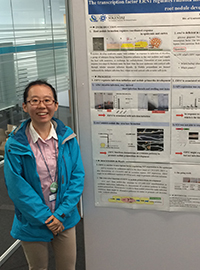
----------------------------------
In October 2017, I had the pleasure of attending the 19th EMBL PhD symposium in Heidelberg, Germany, with four other NIBB students. The symposium was entirely organized by 2nd year EMBL PhD students, who did a really great job in compiling a fantastic meeting. About 100 PhD students from all over the world and 15 invited speakers participated in the symposium. Many students came from Finland and Australia, since EMBL has partnerships and sites in those countries as well. Surprisingly, there were only a few German students, which might reflect the very international character of EMBL. The symposium took place in the ATC (Advanced Training Centre) building on the EMBL campus, located about half an hour from the Heidelberg city center by public transport. The ATC building has an impressive architecture inspired by a DNA double helix, creating a dynamic and innovative atmosphere. This year’s theme was “Bridging the Gaps - Interdisciplinary Approaches in Life Sciences”, so speakers from interdisciplinary fields gave lectures, e.g. synthetic biology, systems biology, tissue engineering, microfluidic technology, and state-of-art fluorescence imaging. Furthermore, there were interesting ‘Science and Society’ talks and a plenary discussion on topics like talking to journalists, women in science, and career paths. Although the schedule of the symposium from 9 am to 8 pm (excluding the evening program) was a little hard, the diverse topics and generous breaks made the symposium a very enjoyable and informative time. I had the chance to present my research in a poster presentation and short talk to a broad audience and got positive feedback from many fellow students. Inspired by the lectures, I want to apply 3D tissue culture, microfluidics, and new fluorescent tools in my future research. The lunch, dinner, coffee breaks and evening program offered many chances to talk with other students. Thus, the meeting was not only a good opportunity to network with peers from various countries, but also to connect with the other NIBB students.
After the EMBL PhD symposium, I visited the philosopher’s path and the castle in the beautiful city center of Heidelberg and met Japanese postdocs, who work at EMBL or the Max-Planck-Institute and shared their experiences in Germany with me. On the last day, I visited the Schultz group, who work on the development of chemical tools for live cell imaging and manipulating cellular signaling. They kindly hosted me the whole day with the following schedule: lab tour, my 30 min presentation, discussion of my research, lunch, coffee and cake, one-to-one discussion with Schultz lab members. Since our fields of study were related, we had lively scientific discussions and they gave me valuable advice for my research.
All in all, I had the impression that EMBL is a great place for postdoc studies, due to the cutting edge research, excellent core-facilities with superb technical support, and high internationality. Finally, I want to thank all the involved EMBL and NIBB members for making these valuable experiences possible which will definitely help me in my future research and career.
19-21, October Ph.D. symposium
23, October Dr. Schultz’s Lab. (Heidelberg)
Division of Quantitative Biology, NIBB
Haruko Miura (Kyoto University)
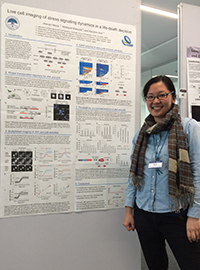
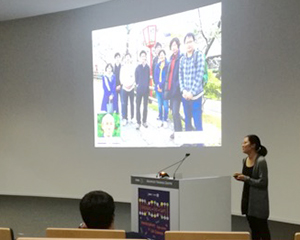
----------------------------------
I visited EMBL in Heidelberg from October 18th to 25th. I participated EMBL PhD symposium and visited Dr. Noh’s Lab.
Many scientists from diverse fields and also some specialists in science communication were invited as speakers of the symposium. I was so surprised that it was entirely organized by PhD students at EMBL and financially supported by many companies.
Of course I enjoyed the many fascinating scientific talks but the most impressive session was about career development. I found that not only Japanese students but also students around the world have similar anxiety about their career, for example whether to choose industry or academia or how to balance work and personal life. There’s no exact answer about it, but not only students but also professors engaged in active debate during the session.
After the symposium, I visited Dr. Noh’s lab and presented my research to her lab members. They kindly asked me many questions and it was a great opportunity for me to rethink my research from other perspectives. I also attended the weekly seminar in which postdocs and students in labs consisting of the Genome Biology Unit present their research. It was really interactive and open. After that, I had a chance to visit Dr. Shotaro Otsuka, a researcher at the Ellenberg Lab at EMBL. He showed me around the lab and told me about life at EMBL and in Europe, which was beneficial for me to think about for my future career.
During my visit, I listened to many lectures by foreign researchers, presented my research in English to people from various countries and I strongly thought that I want to do great research that attracts people from all over the world. I really appreciate the support of NIBB and EMBL for this wonderful experience.
19-21, October Ph.D. Symposium
23, October Dr. Noh’s Lab. (Heidelberg)
Division of Nuclear Dynamics, NIBB
Satoko Ishii (SOKENDAI)
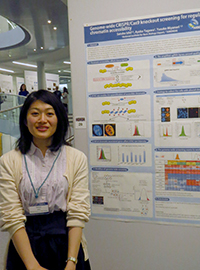
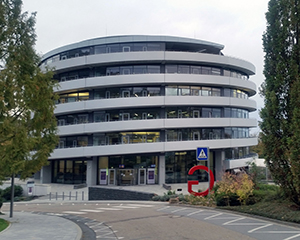
----------------------------------
The 19th EMBL PhD Symposium 2017 <Bridging the Gaps: Interdisciplinary Approaches in the Life Science> and Lab visit at EMBL Rome were great experiences for me. Amazingly, this symposium was organized by only EMBL students. The talks presented great new methods for Scientific Questions as well as various interesting biology research-topics. I had many chances to explain my research to students from EMBL and different universities. I gained great experiences from my first English discussions. I especially enjoyed the discussions at the breaks, the Party and the end of the talks. I felt EMBL students' high motivation and deep/ broad knowledge from their presentations.
After the symposium, I visited Hackett Lab at EMBL Rome.
The atmosphere of his lab was very friendly. Dr. Hackett and his Lab members gave me lots of useful suggestions for my research from various aspects. Dr. Hackett helped me think about my future plans as a fledgling researcher.
Overall I had a good time learning and understanding science thanks to NIBB and EMBL for providing me this wonderful opportunity. I would like to thank everyone involved in the Symposium for the nice time I had in Germany and Italy.
19-21, October Ph.D. Symposium
23, October Dr. Hackett’s Lab. (Roma)
Division of Germ Cell Biology, NIBB
Kodai Hirano (SOKENDAI)
----------------------------------
Thanks to NIBB’s support, I attended the 19th EMBL Ph.D. Symposium held in October 2017 in Heidelberg, Germany. I didn't really know what it was beforehand, but I found out that everything was organized by first year EMBL Ph.D. students. The theme of the symposium, the selection of the lecturers, the acquisition of funding and even the farewell party were arranged by the combined efforts of the EMBL students. The most impressive thing was the autonomous nature of the research and the extra-curricular activities that they were engaged in. This caught my eye more so than the EMBL research facilities, and this helped me understand the purpose of EMBL education programs: nurturing the talents of countless students. I actually felt a little jealous of the European students who are able to select EMBL as their chosen research institute.
When I was at EMBL, I was also able to talk to a highly impressive Japanese Master’s student. The reason why he came was that he had received a lecture from an EMBL professor when he was an undergraduate. His experience made him aspire to enter the EMBL Ph.D. course. I think that an increasing number of Japanese students going to such overseas research institutes and universities is a good thing and that there should be more opportunities in which students are able to find out more information about these types of institutes.
Another thing that impressed me was the passion for research on display at EMBL. This was illustrated by numerous discussions by people eating their meals in the campus' spacious dining hall. Some of these discussions may well have been the starting point for new research.
The Ph.D. symposium itself was very well set out. The presentations by the invited lecturers were very interesting. Many of the presentations by Ph.D. students, who were chosen based on the quality of their posters, were also engaging. After the day's lecture was complete, a topic of interest was chosen and we held what is called a 'Blackboard Session'. This involved taking the lecturer in charge of the day’s session and a small group of students together to hold a discussion. Everyone expressed their opinions quite freely and the participating students asked a lot of questions, which resulted in quite the lively session.
While our schedule was rather tight, our stay atEMBL was a very fruitful one and we were still able to take in the sights of Europe in the autumn when we walked up the small path that lead to EMBL from our hotel in the morning. Thanks to Ms. Ishii, a fellow participant from NIBB, we were able to meet the Japanese researchers based at Heidelberg University and EMBL during our day off. In addition to having various other conversations, we used this time to talk about what it is to conduct research abroad while having a meal of Wiener schnitzel, a well-known German specialty. I found this time both meaningful, but also enjoyable.
On the day before my final day in Germany, I visited Dr. Hiiragi's laboratory, and made a presentation about my own research which in itself received a lot of feedback. After that, I was told about the details of the research that the lab was conducting from the lab members. Although I was a little nervous visiting a laboratory on my own, I also came away thinking that I had gained much from the visit. I also left feeling more confident as well.
In closing, I would like to thank the NIBB faculty members and the staff of the Office of International Cooperation who helped arrange my EMBL visit, as well as all EMBL staff and students, including the members of Hiiragi lab.
19th-21st October: Ph.D. Symposium
23rd October: Dr. Hiiragi's Lab (Heidelberg)
Division of Evolutionary Biology, NIBB
Yuta Horiuchi (SOKENDAI)
----------------------------------